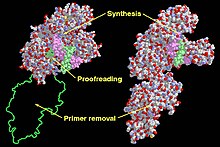DNA Polymerase I
| DNA polymerase I | |
|---|---|

Functional domains in the Klenow Fragment (left) and DNA Polymerase I (right).
|
|
| Identifiers | |
| Organism |
(str. K-12 substr. MG1655) |
| Symbol | polA |
| Entrez | 948356 |
| PDB | 1DPI |
| RefSeq (Prot) | NP_418300.1 |
| UniProt | P00582 |
| Other data | |
| EC number | 2.7.7.7 |
| Chromosome | genome: 4.04 - 4.05 Mb |
DNA polymerase I (or Pol I) is an enzyme that participates in the process of prokaryotic DNA replication. Discovered by Arthur Kornberg in 1956, it was the first known DNA polymerase (and, indeed, the first known of any kind of polymerase). It was initially characterized in E. coli and is ubiquitous in prokaryotes. In E. coli and many other bacteria, the gene that encodes Pol I is known as polA. The E. coli form of the enzyme is composed of 928 amino acids, and is an example of a processive enzyme—it can sequentially catalyze multiple polymerisations without releasing the single-stranded template. The physiological function of Pol I is mainly to repair any damage with DNA, but it also serves to connect Okazaki fragments by deleting RNA primers and replacing the strand with DNA.
In 1956, Arthur Kornberg and his colleagues discovered Pol I by using Escherichia coli (E. Coli) extracts to develop a DNA synthesis assay. The scientists added [14C]-labeled Thymidine so that a radioactive polymer of DNA, not RNA, could be retrieved. To initiate the purification of DNA Polymerase, the scientists added Streptomycin sulfate to the E. coli extract which created a precipitate that consisted of nucleic acid-free supernatant (S-fraction) and nucleic acid-containing precipitate (P-fraction). It was discovered that the P-fraction contained Pol I and heat-stable factors that were essential for the DNA synthesis reactions to undergo extreme temperatures. These factors were identified as nucleoside triphosphates, the building blocks of nucleic acids. The S-fraction contained multiple deoxynucleoside kinases. In 1959, the Nobel Prize in Physiology or Medicine was awarded to Arthur Kornberg and Severo Ochoa “for their discovery of the mechanisms involved in the biological synthesis of Ribonucleic acid and Deoxyribonucleic Acid.”
...
Wikipedia
